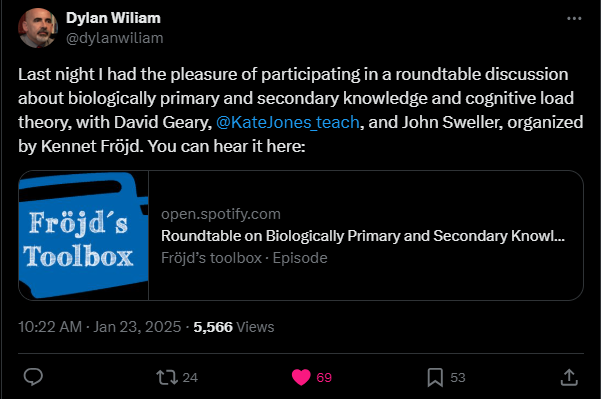The week began with a walk around St George’s Lake in Creswick. This lake, like Lake Wendouree, is one of my favourites and has featured before in Curios. We took Alfie along and he was in his element, with unusual smells to explore.
We are easing into the new school year. Following our senior staff conference in Torquay on The Great Ocean Road, we returned to Sturt Street for new staff induction and then the first of our two staff professional learning days. After I visited Michaela Community School in London and had a discussion with Katharine Birbalsingh about her approach, we decided to make new staff induction a focus and we decided that Jen, the principal, and I would lead it. That seems to be going well so far. If you would like to be in the room in future, we always accept expressions of interest.
This week’s Curios include ransomware, some backpedaling, a culture shock and much more.
Anomalous result of the week
Achievement and motivation are correlated with each other but which comes first? A famous paper on the motivation of elementary school children studying maths in Canada found that achievement led to later motivation but motivation did not lead to later achievement. However, the consensus opinion is probably that there is more of a two-way effect. The problem for researchers is that motivation is a difficult concept to pin down. We think we know what it means but we end up measuring a variety of different proxies. For example, is a motivated child one who picks up their pen, perhaps begrudgingly, and gets to work, or one who is curious about the concepts involved? Is motivation a behaviour or a state of mind?
This means that scholars tend to pick the proxy for motivation that resonates with them.
A new paper by Elisa Santana-Monagas and colleagues focuses on measures described as ‘autonomous motivation’ and ‘controlled motivation’. They surveyed Spanish high school students across subsequent trimesters to assess these types of motivation and they also collected school grades. They found no relationship between controlled motivation and achievement, but they found autonomous motivation led to later achievement while achievement did not lead to later autonomous motivation.
Controlled motivation, as defined by the authors, is about avoiding negatives such as feelings of guilt. I’m not entirely sure what to make of the result except that in this body of literature—known as self-determination theory—control is generally considered bad.
Autonomous motivation, ‘is performing activities for their own sake, with volition and choice, because of the inherent value or enjoyment the activity brings.’ This definition is based on a particular activity and this is what seems to differentiate it from ‘personal interest’, a related motivation proxy that involves inherent interest in the relevant concepts or ideas. How would an activity-based motivation proxy deal with deliberate practice, where we choose to complete an activity that is not inherently valuable or enjoyable in order to achieve some greater goal?
If teachers adopt autonomous motivation as our proxy for motivation more generally, it suggests we should select enjoyable activities for students to complete and yes, when faced with a choice of two equally valid tasks, we should bear this in mind. However, we need to be careful. For example, giving a student who has little autonomous motivation for maths the task of making a PowerPoint presentation about triangles instead of completing a maths task will not affect their motivation for maths.
Perhaps it is not surprising that different researchers using different proxies for the slippery eel of motivation obtain different results.
Discussion of the week
The distinction between biologically primary and secondary knowledge is an important and controversial one. Dylan Wiliam, David Geary, Kate Jones and John Sweller recently participated in a round table discussion of this idea. David Geary is the evolutionary educational psychologist who originally proposed it back in the 1990s.
You can listen to the discussion here:
Intervention of the week
As readers of Curios, you will be familiar with tales of woe from Scotland. However, this week, I offer a ray of light in the form of a new paper—although I do have a tiny, minor quibble.
Keep reading with a 7-day free trial
Subscribe to Filling The Pail to keep reading this post and get 7 days of free access to the full post archives.






